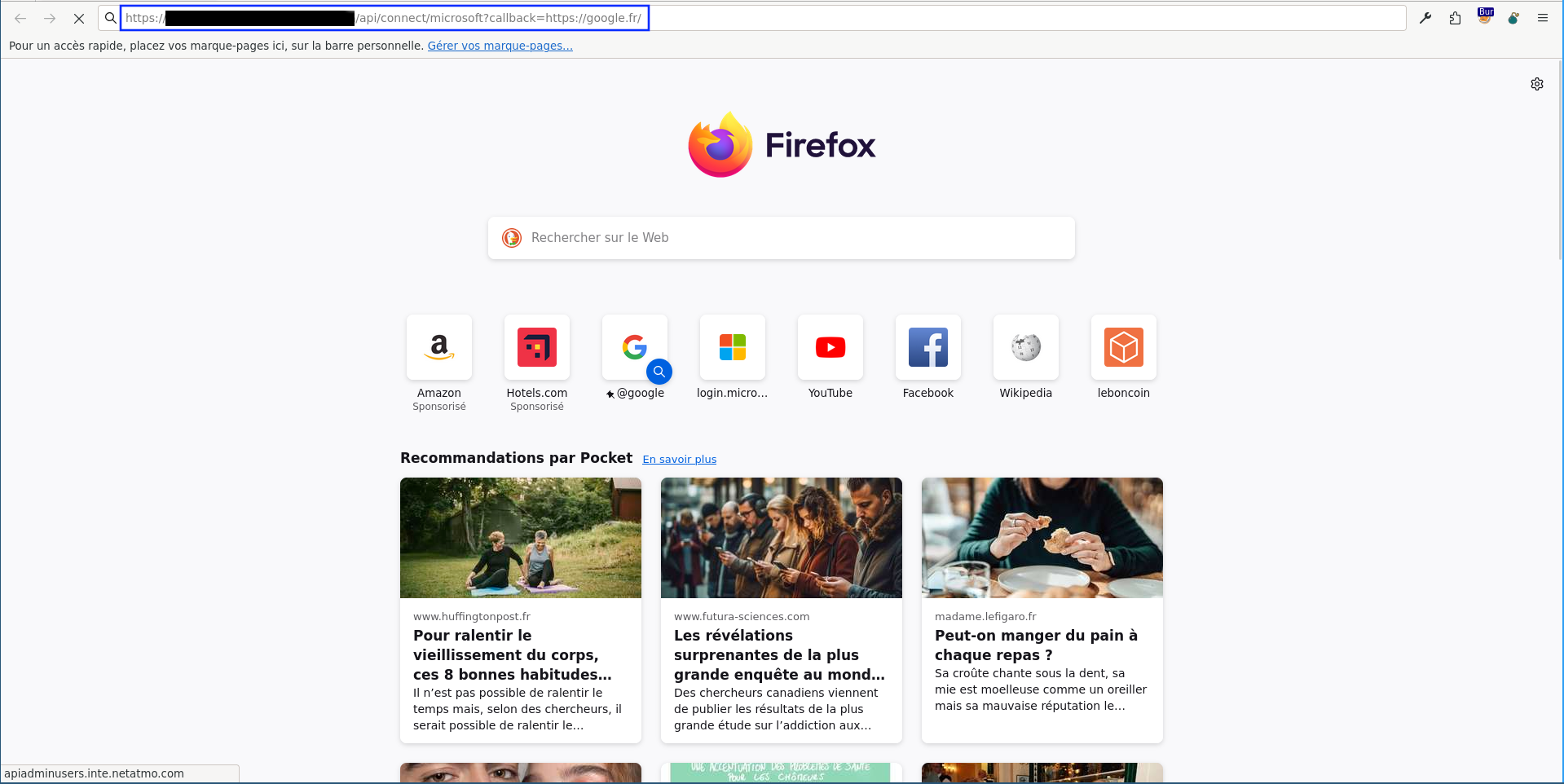fix(deps): update dependency @strapi/plugin-users-permissions to v4.24.2 [security] #197
Add this suggestion to a batch that can be applied as a single commit.
This suggestion is invalid because no changes were made to the code.
Suggestions cannot be applied while the pull request is closed.
Suggestions cannot be applied while viewing a subset of changes.
Only one suggestion per line can be applied in a batch.
Add this suggestion to a batch that can be applied as a single commit.
Applying suggestions on deleted lines is not supported.
You must change the existing code in this line in order to create a valid suggestion.
Outdated suggestions cannot be applied.
This suggestion has been applied or marked resolved.
Suggestions cannot be applied from pending reviews.
Suggestions cannot be applied on multi-line comments.
Suggestions cannot be applied while the pull request is queued to merge.
Suggestion cannot be applied right now. Please check back later.



This PR contains the following updates:
4.24.0->4.24.2GitHub Vulnerability Alerts
CVE-2024-34065
Summary
By combining two vulnerabilities (an
Open Redirectandsession token sent as URL query parameter) in Strapi framework is its possible of an unauthenticated attacker to bypass authentication mechanisms and retrieve the 3rd party tokens. The attack requires user interaction (one click).Impact
Unauthenticated attackers can leverage two vulnerabilities to obtain an 3rd party token and the bypass authentication of Strapi apps.
Technical details
Vulnerability 1: Open Redirect
Description
Open redirection vulnerabilities arise when an application incorporates user-controllable data into the target of a redirection in an unsafe way. An attacker can construct a URL within the application that causes a redirection to an arbitrary external domain.
In the specific context of Strapi, this vulnerability allows the SSO token to be stolen, allowing an attacker to authenticate himself within the application.
Remediation
If possible, applications should avoid incorporating user-controllable data into redirection targets. In many cases, this behavior can be avoided in two ways:
If it is considered unavoidable for the redirection function to receive user-controllable input and incorporate this into the redirection target, one of the following measures should be used to minimize the risk of redirection attacks:
Example 1: Open Redirect in /api/connect/microsoft via
$_GET["callback"]$_GET["callback"]Payload:
Final payload:
User clicks on the link:

Look at the intercepted request in Burp and see the redirect to Microsoft:
Microsoft check the cookies and redirects to the original domain (and route) but with different GET parameters.
Then, the page redirects to the domain controlled by the attacker (and a token is added to controlled the URL):
The domain originally specified (https://google.fr) as
$_GET["callback"]parameter is present in the cookies. So <TARGET> is using the cookies (koa.sess) to redirect.koa.sesscookie:{"grant":{"provider":"microsoft","dynamic":{"callback":"https://google.fr/"}},"_expire":1700234244263,"_maxAge":86400000}The vulnerability seems to come from the application's core:
File: packages/plugins/users-permissions/server/controllers/auth.js
And more specifically:
... // Ability to pass OAuth callback dynamically grantConfig[provider].callback = _.get(ctx, 'query.callback') || _.get(ctx, 'session.grant.dynamic.callback') || grantConfig[provider].callback; grantConfig[provider].redirect_uri = getService('providers').buildRedirectUri(provider); return grant(grantConfig)(ctx, next); ...Possible patch:
_.get(ctx, 'query.callback')=$_GET["callback"]and_.get(ctx, 'session')=$_COOKIE["koa.sess"](which is{"grant":{"provider":"microsoft","dynamic":{"callback":"https://XXXXXXX/"}},"_expire":1701275652123,"_maxAge":86400000}) so_.get(ctx, 'session.grant.dynamic.callback')=https://XXXXXXX/.The route is clearly defined here:
File: packages/plugins/users-permissions/server/routes/content-api/auth.js
File: packages/plugins/users-permissions/server/services/providers-registry.js
If parameter
$_GET["callback"]is defined in the GET request, the assignment does not evaluate all conditions, but stops at the beginning. The value is then stored in the cookiekoa.sess:koa.sess=eyJncmFudCI6eyJwcm92aWRlciI6Im1pY3Jvc29mdCIsImR5bmFtaWMiOnsiY2FsbGJhY2siOiJodHRwczovL2FkbWluLmludGUubmV0YXRtby5jb20vdXNlcnMvYXV0aC9yZWRpcmVjdCJ9fSwiX2V4cGlyZSI6MTcwMTI3NTY1MjEyMywiX21heEFnZSI6ODY0MDAwMDB9Which once base64 decoded become
{"grant":{"provider":"microsoft","dynamic":{"callback":"https://<TARGET>/users/auth/redirect"}},"_expire":1701275652123,"_maxAge":86400000}.The signature of the cookie is stored in cookie
koa.sess.sig:koa.sess.sig=wTRmcVRrn88hWMdg84VvSD87-_0File: packages/plugins/users-permissions/server/bootstrap/grant-config.js
Vulnerability 2: Session token in URL
Description
Applications should not send session tokens as URL query parameters and use instead an alternative mechanism for transmitting session tokens, such as HTTP cookies or hidden fields in forms that are submitted using the POST method.
Example 1: SSO token transmitted within URL (
$_GET["access_token"])$_GET["callback"]When a callback was called, the 3rd party token was transmitted in an insecure way within the URL, which could be used to increase the impact of the Open Redirect vulnerability described previously by stealing the SSO token.
Weaponized payload:
With a web server specially developed to exploit the vulnerability listening on <C2>:8080, it is possible to retrieve a JWT token allowing authentication on Strapi.
A user is on his browser when he decides to click on a link sent to him by e-mail.
The server specially developed by the attacker to show that the vulnerability is exploitable, recovers the user's SSO token.
Because the victim didn't change to another Web page.
The attacker can use the SSO token to authenticate himself within the application and retrieve a valid JWT token enabling him to interact with it.
Details
Get the JWT token with the
access_tokenFirst of all, thanks to the SSO token, you authenticate yourself and get a JWT token to be able to interact with the various API routes.
Request (HTTP):
Response (HTTP):
Request API routes using the JWT token
Then reuse the JWT token to request the API.
Request (HTTP):
Response (HTTP):
POC (Web server stealing SSO token and retrieving JWT token then bypassing authentication)
Release Notes
strapi/strapi (@strapi/plugin-users-permissions)
v4.24.2Compare Source
Strapi was made aware of a vulnerably that were patched in this release, for now we are going to delay the detailed disclosure of the exact details on how to exploit it and how it was patched to give time for users to upgrade before we do public disclosure.
📚 Update and Migration Guides
Full Changelog: strapi/strapi@v4.24.2...v4.24.1
v4.24.1Compare Source
🔥 Bug fix
📚 Update and Migration Guides
Configuration
📅 Schedule: Branch creation - "" in timezone Europe/Paris, Automerge - At any time (no schedule defined).
🚦 Automerge: Enabled.
♻ Rebasing: Whenever PR is behind base branch, or you tick the rebase/retry checkbox.
🔕 Ignore: Close this PR and you won't be reminded about this update again.
This PR was generated by Mend Renovate. View the repository job log.